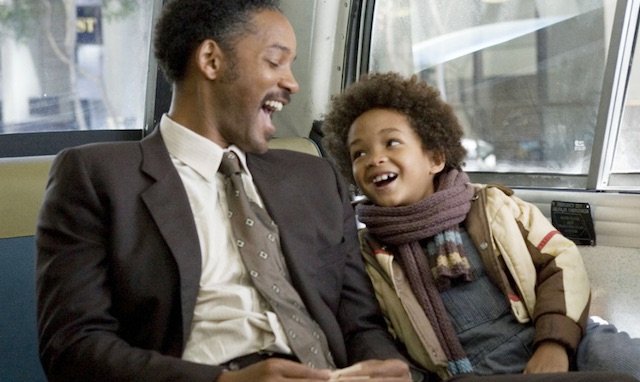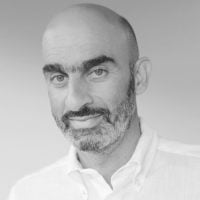
“The meaning of life is just to be alive. It is so plain and so obvious and so simple. And yet, everybody rushes around in a great panic as if it were necessary to achieve something beyond themselves.” ~ Alan W. Watts
Seven years ago, I was earning more money than I do today.
I owned a nicer car, and my social life was much more engaging. My kids were around me all the time and a source of great happiness to me.
Looking from the outside in, I was the epitome of happiness. And yet, inside, I found myself inexplicably frustrated and ambivalent. I experienced regular bouts of panic attacks, which would then lead me to short periods of depression.
Today, I sit contemplating what it means to be happy.
My kids are far away—on different continents to me. My company is passing through a challenging time. I’ve just broken my leg and I’m in constant pain. I’m finding it difficult to focus for more than an hour and feel frustrated because I just can’t get much done.
However, I know I’m ultimately much happier now than I was when everything seemed so bright.
Many people, when asked what their purpose is in life, respond with the obvious, “I want to be happy.” And yet, most of them don’t know what it is that makes them happy. Happiness is subjective, in that it means different things to different people.
What is happiness, then?
The Oxford Dictionary defines it as, “Feeling or showing pleasure or contentment.”
Positive Psychology defines a happy person as someone who experiences more positive emotions such as joy, passion, and pride and less negative emotions such as sadness, anxiety, and anger.
In Greek philosophy, happiness translates from a concept known as “eudaimonia,” which refers to “the good life,” or a flourishing life lived in harmony with one’s true self. In this worldview, happiness is much more than an emotional state.
It is this last definition that resonates with me, as it appears to be a more complete understanding of happiness. One that includes pain, struggle, and acceptance of one’s situation. This happiness does not preclude feeling negative emotions, but rather suggests we feel them less frequently. As such, this happiness carries more meaningful connotations.
Happiness does not mean being joyful, content, and comfortable all the time.
Happiness is not a destination, but rather a process.
Happiness is not a product, but rather a byproduct of what we do in life.
To believe otherwise is not only naive, but irresponsible and limiting. Our life’s journey should include our struggles, challenges, and pain, all of which ultimately lead us to growth. Unlike social media, real life can’t just show the wins, laughs, and thumbs up.
On many occasions, we may go out and pursue what we think will make us happy, only to find that what we chased doesn’t achieve our goal at all. In my journey, I found that my search for happiness was actually more pivotal than what I “found” at the time, because the quality of my questions became deeper and narrower.
In fact, I often arrived at my goals disappointed, like when I yearned for social status and Rolex watches, only to find that within a few months they meant nothing to me.
This confirmed to me that finding out what truly made me happy would be a “trial and error” experiment. What drives happiness is based on our inner belief systems and core values.
Unfortunately, we often find out late in life that not all our values and beliefs are genuinely ours. The values that drive our parents, teachers, and environment can be quite different from the ones that drive us. And yet, somehow we get burdened by those hand-me-down values, beliefs, likes, and dislikes.
I grew up in a society where prestige and social status mattered, and it wasn’t until my late thirties that I concluded prestige didn’t make me happy. Suddenly, with that realization, a whole new world opened up to me where I alone became the source of my self-esteem.
In addition, we all go through different stages in our lives. The things that make us happy and content at age 21 usually become irrelevant when we are 30, 40, and 50. But that ultimately depends on whether or not we are growing and evolving.
Reality is simple, however. As per the Alan Watts quote above, to enjoy a good life and be happy, we simply need to be alive.
To truly be alive, I believe we need to cultivate the following three states of mind.
Self-acceptance
Living fearlessly and authentically is about accepting ourselves fully. We are perfect, and yet imperfect. We are pure love, and yet riddled with fear and self-doubt.
Self-acceptance does not mean being lazy and settling for mediocre results. Rather, it means we give our best in whatever we pursue, but don’t get attached to the results of our efforts. We compare ourselves not to others, but to who we were before. We forsake this paralyzing concept of perfection, as it doesn’t exist; instead we become vulnerable, putting ourselves out there and trusting that the universe will support our intentions.
Only when I wrote about my broken leg and put it out into the ether did my self-pity and pain begin to mellow. Like some kind of magic, I find that the minute I share my hurt, it then slowly begins to dissipate.
Presence
Maria Popova says,
“We should all stop measuring our days by degree of productivity and rather start experiencing them by degree of presence. In The Wisdom of Insecurity: A Message for an Age of Anxiety, Alan Watts argues that the root of our human frustration and daily anxiety is our tendency to live for the future, which is an abstraction. He writes: ‘If to enjoy even an enjoyable present we must have the assurance of a happy future, we are crying for the moon.’ We have no such assurance.”
Simply put, every time we think of the future, we rob ourselves of an ounce of happiness. We must stay in the now and find the practices, places, and people who put us there.
For me, these practices and people are writing, my inner circle of family and friends, and being in nature.
Action
Action, they say, is the language of the gods. There is something magical and expansive about committing to action. It starts with a small step or open declaration that somehow frees us, compelling us to take the particular action we choose. “I’m writing a book,” or “I’m running the Berlin marathon,” or “I’m starting the new business I’ve always dreamed of,” becomes the light we dare not douse.
Action leads to showing up in life, which then leads to happiness (a “flourishing life”). And there’s nothing we need to do in life but show up. The happiest times I have come when I promise my muse that I’ll show up to write for four hours nonstop (like today) and I do so. This kind of joy fills my cup not only for those four hours, but for the next couple of days.
When we live simply, without ego, accept ourselves without comparison to others, try as much as possible to stay in the present, and take every day as an action adventure, then we will be happy, no matter the ups and downs.
Happiness, therefore, truly is being alive, recording and staying present to all our experiences, be they full of joy or fraught with pain.
~
Author: Mo Issa
Image: The Pursuit of Happyness/YouTube
Editor: Lieselle Davidson
Copy Editor: Sara Kärpänen











Read 0 comments and reply